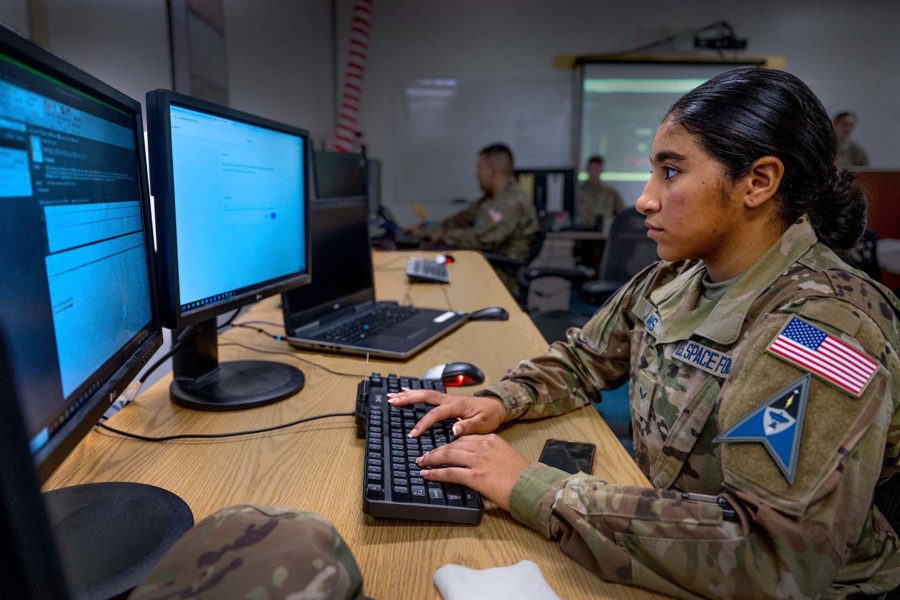Space Force Guardians face a temporary ban on using generative artificial intelligence tools and large language models (LLM) for official purposes.
The move, first reported by Bloomberg, was announced in a Sept. 29 memo from Lisa Costa, the Space Force’s Chief Technology and Innovation Officer.
According to the memo, obtained by Air & Space Forces Magazine, Guardians are forbidden from using government data in generative AI solutions unless they receive official approval.
IBM describes Generative AI as programs “that can generate high-quality text, images, and other content based on the data they were trained on”—platforms such as OpenAI’s ChatGPT and Ask Sage, a model designed for government work by the Department of the Air Force’s former chief software officer Nicolas M. Chaillan.

In an interview with Air & Space Forces Magazine, Chaillan argued against the Space Force’s move, citing concerns about the efficacy of prohibiting an entire technology or platform and the potential risks linked to personnel accessing these platforms on their personal devices.
“When people are banned from using government equipment and you’re banned from using your device (to access these platforms), it’s going to push people to use their personal device. People have created personal accounts on the platform, which creates more risk. All you’re doing when you do things like this, is the creation of more shadow IT and more cyber risk,” Chaillan said.
According to Chaillan, Ask Sage was developed on government clouds and constructed to fulfill all cybersecurity prerequisites. He said over the past six months, roughly 500 Guardians utilized the platform, with no reported security incidents. He also said there are presently 10,000 Ask Sage users throughout the Department of Defense.
A Pentagon spokesperson said they were unable to verify the exact number of Ask Sage users, but in a statement, they echoed many of the same concerns Costa referenced in her memo.
“LLMs offer great promise to assist DOD personnel in accomplishing a wide variety of tasks, however we must ensure that sensitive DOD data is safeguarded when using such platforms,” the spokesperson said via email. “Valid concerns have also been voiced about the traceability and validity of answers provided by LLMs.”
Space Force spokesperson Maj. Tanya Downsworth told Air & Space Forces Magazine that Costa’s memo institutes a “temporary, strategic pause to evaluate the best path forward to align this capability into the USSF mission that protects the data of our service and Guardians.”
She added that the service will be looking at risk management methods and encourage pilot programs to gather data to inform decisions.
Chaillan, however, argued any delay with such a rapidly evolving technology means risking losing ground against the likes of China. Beijing has expressed aspirations to take the lead in harnessing the power of generative artificial intelligence across a spectrum of military applications to reshape the future of warfare.
When ChatGPT first gained popularity earlier this year, defense officials all the way up to Air Force Secretary Frank Kendall suggested the technology may have myriad uses, from acquisition to mission planning.
But the Space Force’s decision tempers some of that excitement. For his part, Chaillan suggested the possibility of the DOD considering the development of their own technology utilizing generative AI and LLM.
“(It) makes me wonder if they’re thinking of building their own stuff, which is going to be massive taxpayers’ spending,” he said. Chaillan quit his Air Force job in 2021, citing the lack of funding for crucial technologies in the joint all-domain command and control (JADC2) as the tipping point for his resignation.
So far, there has been no public discussions by Pentagon officials about building their own GenAI/LLM model. However, in August, the DOD announced the establishment of Task Force Lima, led by the DOD’s Chief Digital and Artificial Intelligence Office. This task force is dedicated to advancing national security through GenAI in diverse areas of defense.
Costa’s memo highlighted her office’s participation in Task Force Lima, with a shared objective to “responsibly and strategically utilize the capabilities of GenAI and LLMs.”
Costa also expressed confidence in the long-term utility of the technology, writing that Gen AI will “undoubtedly revolutionize our workforce and enhance Guardians’ ability to operate at speed.”
Regarding the duration of the ban, Downsworth said the CTIO intends to accelerate the formulation and issuance of specific USSF guidance, possibly within 30 days of the memo’s publication.
